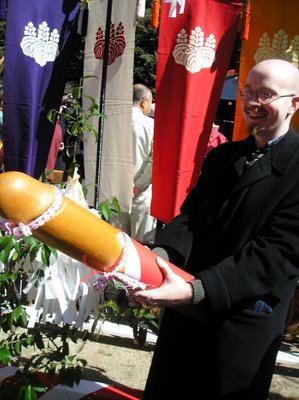The Meaning of Candy
Over the past week I've spent a lot of time making a real story out of "Porcelain." I refuse to post it, though, as I realize that the character I later write of quite loathingly is basically my ideal vision of myself. Freaky!!!
"I'd like a Kit Kat." Seems like a rather simple statement doesn't it? Apparently, it demands a response: "what flavor Kit Kat do you want?" "What do you mean, 'what flavor?' Get me a fucking Kit Kat!" But it's not that simple. You have your wine Kit Kat, maccha (powdered green tea) Kit Kat, passion fruit Kit Kat, your cherry (the flower not the fruit) Kit Kat, your white chocolate Kit Kat, your dulce du leche Kit Kat, etc. and so forth. I even bought a Kit Kat recently that came with the new Kimura Kaela single.

So, the future of numerous students has been decided, namely whether they will continue to run the gauntlet of endless studying for entrance exams or drop out and do something marginally useful. I saw a student going into an exam with a pair of Kit Kats, and I, being hungry and a bit greedy, ask him if I can have one. His reply, "absolutely not!" It's difficult to describe how rude abruptness is in Japanese, so you're just going to have to believe me that it is. But you see, he dare not give away his precious Kit Kat at such an important time.
Why?
A linguistic oddity: two candy bars are Kit Kats and one is a Kit Kat. Transliterate the former into Japanese, and you get "kitto katsu," which interestingly enough is homophonous with the phrase that means "I'll definitely succeed." However, take away that precious English s and transliterate again. What do you get? "Kitto Katto," which would be "definitely cut." If he were to give away one of his Kit Kats, he'd literally be tempting fate. Considering how apoplectic students get about exams in this country, I can see why he reacted the way he did.
The Kit Kat, then, is no longer food; it is now a kind of totem or charm, like the little badges you can buy at shrines to promote success in business, fertility, or good health. To eat the candy would destroy its lingui-mystical power. All of this is my long winded way of explaining why I think they taste like crap.



